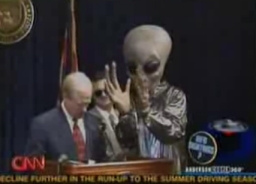Belittling Ufology
 How many times in the history of ufology has flip derision been the media’s or the government’s reaction? Arizona Governor Fife Symington’s farcical, dismissive news conference after the Arizona Lights incident, for example (as shown in James Fox’s terrific documentaries Out of the Blue
How many times in the history of ufology has flip derision been the media’s or the government’s reaction? Arizona Governor Fife Symington’s farcical, dismissive news conference after the Arizona Lights incident, for example (as shown in James Fox’s terrific documentaries Out of the Blue and I Know What I Saw). Or the vaguely comedic spin given to UFO stories in the media (see Richard Dolan’s essay, “How to Marginalize an Astronaut”). Dismissive reactions by the media are often attributed to the long history of government or military interference and manipulation aimed to discredit the phenomenon (and thereby keep it out of public consciousness, other than as a joke). But I don’t think it is necessary to always invoke “the government” to explain the belittling of UFOs and ufology.
Although I have no doubt that government manipulation has occurred and still occurs—Dolan’s UFOs and the National Security State, Volumes I and II, document it extensively (and depressingly)—I suspect the reasons the mainstream media and even just “people on the street” fail to take the subject of UFOs seriously is somewhat less sinister: the plain human unpreparedness to confront troubling philosophical subjects. People are quite happy accepting that UFOs may be real and that we are not alone, but they don’t want to have to think about the implications until absolutely necessary.
It’s a normal way of dealing with big and traumatic subjects. Death is a good example: We all can accept “intellectually” our own mortality, but most of us go about our daily lives pretending it won’t happen to us and not facing squarely its significance. Whether it is because it is upsetting, or because we just don’t feel philosophically up to the task, or because we are just lazy, we don’t think about death except in the abstract unless and until we are forced to. More often, we make jokes and belittle the subject. Gallows humor.
The probable existence (and possible presence) of much-more-advanced or intelligent beings is perhaps not on par with death, but as worldview-altering truths go, it is not too far from the top. Consequently, busy people deal with it the way they deal with other philosophically complicated matters they really don’t know how to confront squarely at the time—they laugh it off. To his credit, Symington, who was among the many astonished witnesses of the lights over Phoenix that night in 1997, later acknowledged that his flippant news conference had sort of this motivation.
Frustration at this apparent dismissiveness inspires ufologists to want to shake the public’s lapels, but they should recognize that people are probably more affected by the subject than they let on. Ordinary people just don’t want to have to get serious, then and there, in public, about something they are not prepared to get serious about.



